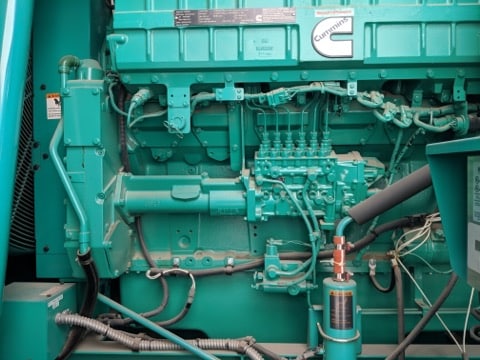4-Stroke Engines: What They Are and How They Work

If you’re wondering what a 4-stroke engine is, then you’ve come to the right place. Woodstock Power has all the basic information you need on generators. It’s important to be informed so you can make the right decision for your application. We’ll breakdown how 2-stroke and 4-stroke engines work, the main differences between them, and the pros and cons for each. If you need help determining which generator would be right for you, contact us and we’d be happy to help!
How Does a 2-Stroke Engine Work?
Firstly, what is a 2-stroke engine? What is a 4-stroke engine? Well, 2-stroke (or two cycle) engines do not have valves or a specified lubrication system. So, 2-stroke engines are much simpler than their 4-stroke counterparts. They’re usually used in handheld lawn equipment and require oil mixed with fuel.
Here’s how 2-stroke engines typically work:
- Fuel and air compress in the main cylinder (compression stroke).
- The spark plug fires, causing an explosion that drives the piston downwards (power stroke).
- When the piston is nearing the end of its stroke, the exhaust port is uncovered.
- The pressure in the cylinder drives most of the exhaust gasses out of the cylinder through the exhaust port.
- As the piston hits the bottom, the intake port is uncovered and more fuel and air are pulled into the main cylinder to start the process over again.
Pros
- No valves, simpler construction
- Fire once per revolution so it has a higher power output than a 4-stroke engine
- Lighter, making it cheaper to manufacture
- Potential for twice the power than a 4 stroke engine of the same size
- Less maintenance
Cons
- Shorter lifespan than 4-stroke engine because of not having a specified lubrication system
- Having to mix fuel and oil to lubricate the engine can get expensive
- Not fuel-efficient engines
- Produce more pollution
Though rare in generator sets these days, you can still come across excellent 2-stroke engines like the popular Detroit Diesel model 71 and the 92.
How Does a 4-Stroke Engine Work?
A 4-stroke engine has a cycle that consists of 4 strokes per cycle. In those 4-strokes, the piston goes around twice in the engine, so the spark plug fires every other rotation. Two separate valves exist in this type of engine: one for intake and one for exhaust, unlike the 2-stroke engine.
These engines power lawnmowers, cars, and generators. They have to remain upright in order to work and are much more complex than 2-stroke engines. Rather than oil and fuel mixing, the oil stores in the crankcase. A separate splash lubrication system sits near the oil’s release point. Thus, wear occurs much slower than with 2-stroke engines.
Here’s how a 4-stroke engine works:
- The piston moves up and compresses a fuel and air mixture in the chamber (compression stroke).
- Fuel ignites by the spark plug and drives the piston down providing the necessary momentum to keep the crankshaft turning (power stroke).
- The piston moves back up and pushes the used/burned gasses out of the exhaust valve (exhaust stroke).
- The piston goes back down and draws the fresh air and fuel in preparation to move back up and compress the air (intake stroke).
Pros
- 4-stroke engines have more torque, quieter, and more reliable
- Longer lasting over a 2-stroke engine
- No need to mix oil and fuel
- Runs cleaner, less pollution
- Much more fuel-efficient
Cons
- More complicated design, and therefore, harder to repair/troubleshoot
- Half as powerful as a 2-stroke engine of the same size
- More expensive than a 2-stroke engine
- More parts, more expensive to manufacture, more expensive to repair
- Much heavier
Nearly all generators made today have a 4-stroke engine.
Want more Information on 4-Stroke Engines?
Here at Woodstock Power, we’re here to help. So, if you’re more of a visual learner, and want more information about what is a 4 stroke engine, watch this helpful video. You can also find additional information here. Lastly, take a moment to browse our online inventory to see just a few of the generators we have to offer.
So, if you’re wondering which type of generator would work best for you, please feel free to reach out to us. A member of our friendly and capable staff would be delighted to help you. We hope this blog has been beneficial!

